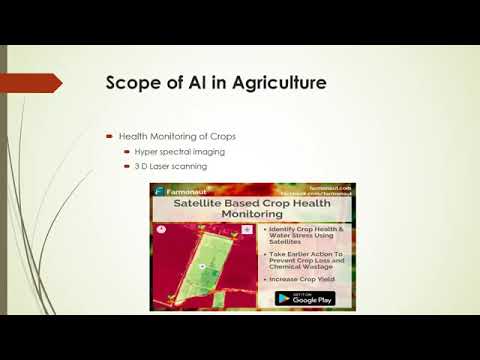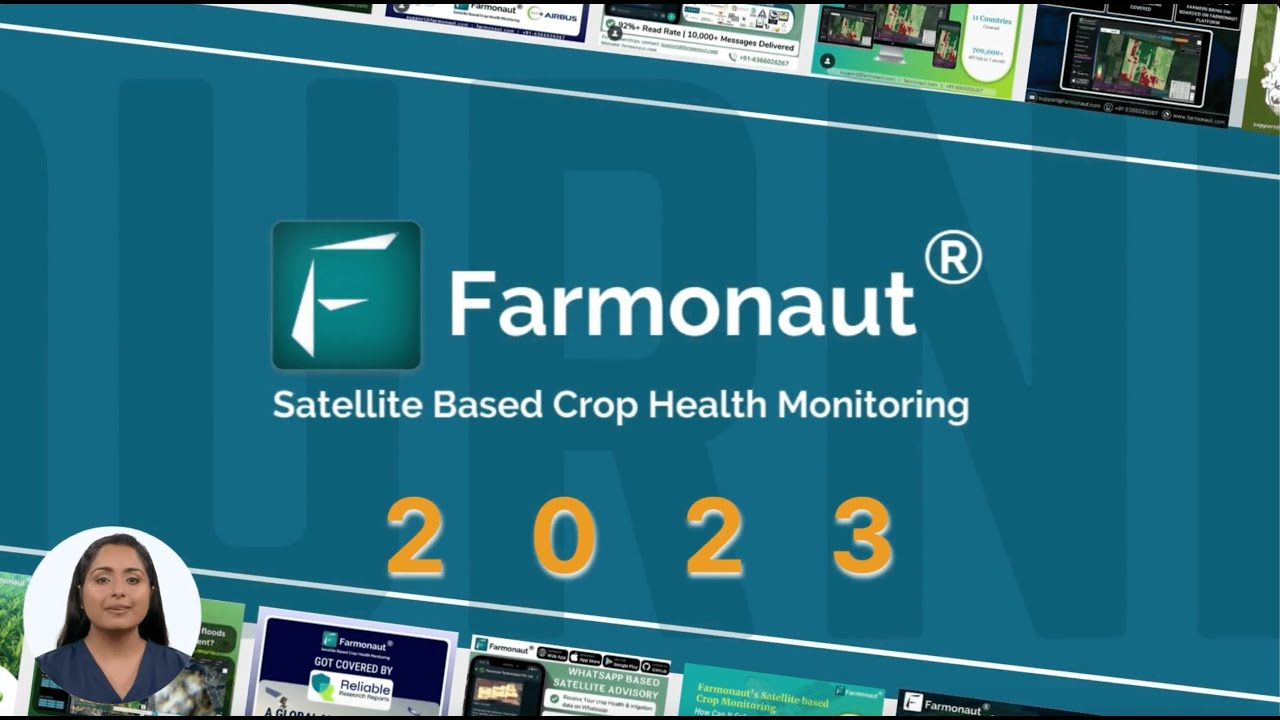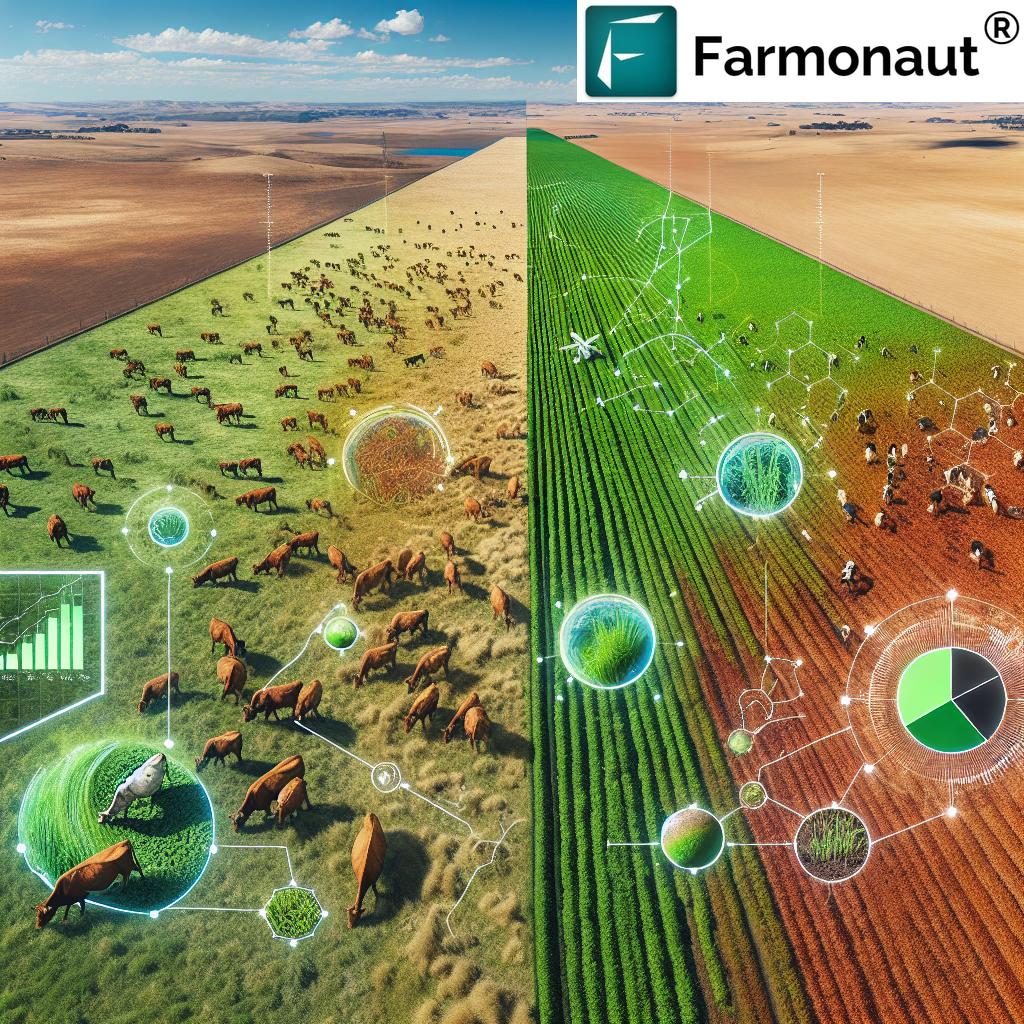10 Critical Forces Shaping Australia’s Agricultural Future: Farmonaut’s Industry Insight
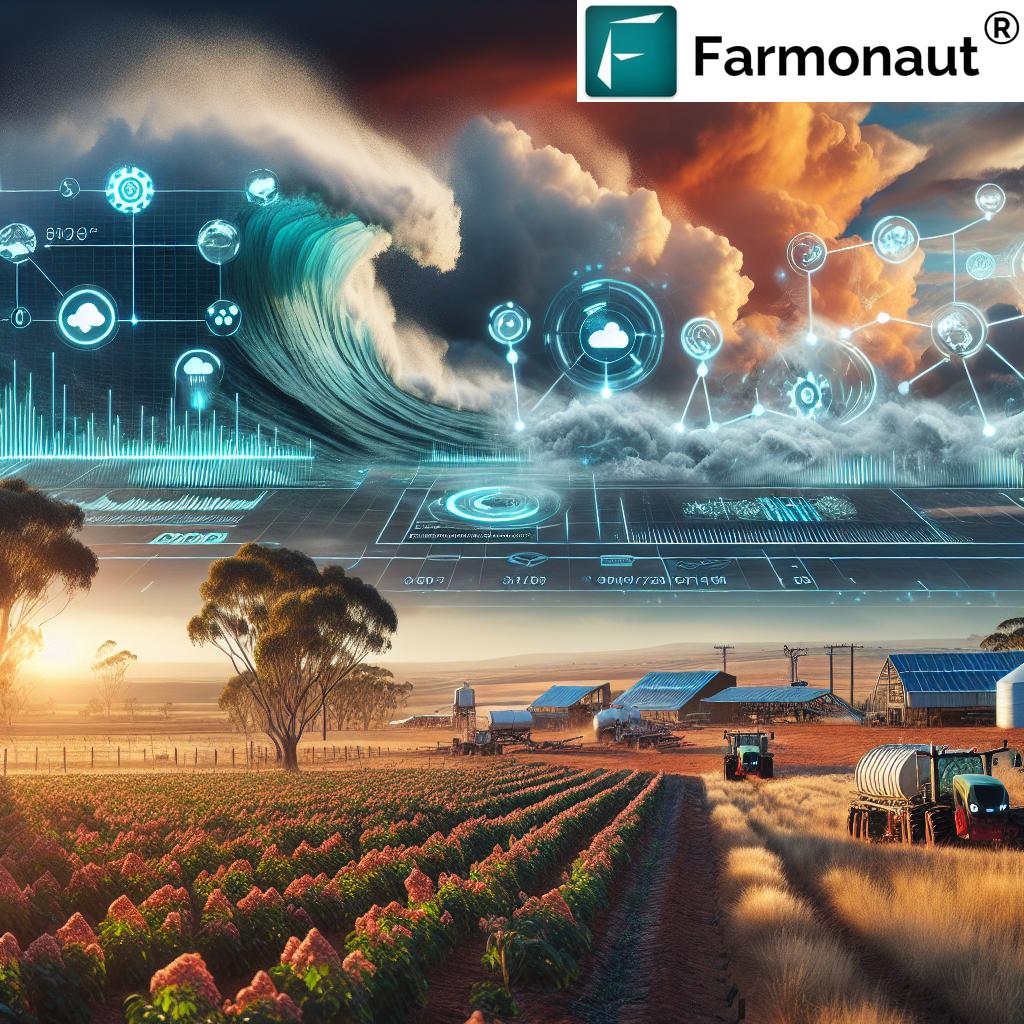
“By 2030, over 50% of Australian farmers may need to implement climate-resilient farming strategies to maintain productivity.”
As we delve into the future of agriculture in Australia, we find ourselves at a critical juncture where traditional farming practices are being reshaped by a myriad of global forces. The agricultural sector, a cornerstone of Australia’s economy, faces unprecedented challenges and opportunities that will define its trajectory for decades to come. In this comprehensive analysis, we at Farmonaut will explore ten critical forces that are set to transform the landscape of Australian agriculture over the next decade.
Our journey through these transformative forces will not only highlight the challenges but also illuminate the innovative solutions that are emerging to address them. From the pressing concerns of climate change to the revolutionary potential of digital technologies, we’ll examine how these factors interplay to create a complex tapestry of change in rural Australia.
1. Climate Change: The Overarching Challenge
Climate change stands as the most significant force shaping the future of agriculture in Australia and globally. Its impacts are far-reaching and multifaceted, affecting every aspect of farming from crop yields to livestock management.
- Shifting Weather Patterns: Farmers are experiencing more extreme weather events, including prolonged droughts, intense heatwaves, and unpredictable rainfall. These changes are altering growing seasons and crop suitability across different regions.
- Water Scarcity: As parts of Australia become drier, water availability for irrigation is becoming a critical issue. This is driving the need for more efficient water management systems and drought-resistant crop varieties.
- Soil Degradation: Changing climate conditions are accelerating soil erosion and altering soil chemistry, affecting nutrient availability and overall soil health.
To address these challenges, Australian farmers are increasingly turning to climate-resilient farming strategies. These include adopting conservation agriculture techniques, implementing precision irrigation systems, and diversifying crop selection to include more heat and drought-tolerant varieties.
At Farmonaut, we recognize the urgent need for tools that can help farmers adapt to these changing conditions. Our satellite-based crop health monitoring system provides real-time data on vegetation health and soil moisture levels, enabling farmers to make informed decisions about resource allocation and crop management in the face of climate variability.
2. Digital Revolution in Agriculture
The digital revolution is transforming every aspect of farming, from planting to harvest and beyond. This technological surge is ushering in an era of precision agriculture, where data-driven decisions are optimizing farm operations and resource use.
- IoT and Sensors: The Internet of Things (IoT) and advanced sensors are enabling real-time monitoring of crop conditions, soil health, and equipment performance.
- AI and Machine Learning: Artificial Intelligence is revolutionizing farm management by providing predictive analytics for crop yields, pest outbreaks, and market trends.
- Robotics and Automation: From autonomous tractors to robotic harvesters, automation is addressing labor shortages and increasing operational efficiency.
These digital technologies are not just improving productivity; they’re also contributing to more sustainable farming practices by optimizing resource use and reducing waste. However, the adoption of these technologies also brings challenges, including the need for digital literacy among farmers and concerns about data security and ownership.
Farmonaut is at the forefront of this digital revolution with our Jeevn AI Advisory System. This AI-driven tool delivers personalized farm advice, weather forecasts, and crop management strategies directly to farmers’ fingertips. By harnessing the power of satellite data and machine learning, we’re helping Australian farmers embrace the benefits of digital agriculture while navigating its complexities.
Explore our innovative API solutions for integrating cutting-edge agtech into your farming operations.
3. Global Market Dynamics and Trade Tensions
The Australian agricultural sector is deeply integrated into global markets, making it susceptible to international trade dynamics and geopolitical tensions. These forces can significantly impact demand, prices, and access to key export markets.
- Trade Agreements: Evolving trade relationships, such as the recent AUKUS pact, can open new opportunities or pose challenges for Australian agricultural exports.
- Market Volatility: Global events, from pandemics to political conflicts, can cause rapid fluctuations in commodity prices and demand.
- Changing Consumer Preferences: International shifts towards plant-based diets or sustainably produced foods are reshaping export opportunities.
“Geopolitical tensions could drive agricultural market volatility by up to 30% in the next decade, affecting global food security.”
To navigate these complex market dynamics, Australian farmers and agribusinesses need to stay informed and agile. This requires access to real-time market data, the ability to quickly adapt production to meet changing demands, and strategies to mitigate risks associated with market volatility.
Farmonaut’s platform contributes to market readiness by providing farmers with tools for efficient production planning and resource management. Our blockchain-based traceability solutions also help Australian producers meet the growing international demand for transparent and sustainably sourced agricultural products.
4. Emerging Technologies and Agtech Innovations
The rapid advancement of technology is revolutionizing the agricultural landscape, offering solutions to long-standing challenges and opening new frontiers in farming practices.
- Vertical Farming: Urban agriculture solutions are gaining traction, offering new possibilities for food production in space-constrained environments.
- Gene Editing: CRISPR and other gene-editing technologies are developing crops with enhanced resilience to pests, diseases, and climate stressors.
- Nanotechnology: Applications in agriculture range from nano-sensors for precise monitoring to nano-fertilizers for improved nutrient delivery.
These technologies hold immense potential for increasing productivity, sustainability, and resilience in Australian agriculture. However, their adoption also raises important considerations regarding regulation, ethics, and public acceptance.
At Farmonaut, we’re committed to staying at the cutting edge of agtech innovations. Our platform integrates seamlessly with various emerging technologies, providing a unified interface for farmers to leverage these advancements effectively.
5. Sustainability and Environmental Pressures
The push for sustainability is reshaping agricultural practices worldwide, and Australia is no exception. Environmental concerns, coupled with consumer demand for eco-friendly products, are driving significant changes in farming methods.
- Carbon Farming: Initiatives to sequester carbon in soil are gaining momentum, offering potential new revenue streams for farmers.
- Biodiversity Conservation: There’s growing recognition of the need to balance agricultural production with biodiversity protection.
- Circular Economy in Agriculture: Efforts to reduce waste and maximize resource efficiency are leading to innovative approaches in farm management.
These sustainability pressures present both challenges and opportunities for Australian farmers. While adapting to more sustainable practices may require initial investments, it can lead to long-term benefits including improved soil health, reduced input costs, and access to premium markets for sustainably produced goods.
Farmonaut’s carbon footprinting feature helps agribusinesses monitor and reduce their environmental impact. By providing real-time data on emissions, we enable farmers to take concrete steps towards sustainability and compliance with environmental regulations.
Download our Android app or iOS app to start monitoring your farm’s sustainability metrics today.


6. Demographic Shifts and Labor Challenges
The changing demographics of rural Australia and evolving workforce dynamics are significantly impacting the agricultural sector.
- Aging Farmer Population: With the average age of Australian farmers increasing, there’s a pressing need for succession planning and attracting younger generations to agriculture.
- Rural-Urban Migration: The ongoing trend of rural populations moving to urban areas is creating labor shortages in agricultural regions.
- Changing Skill Requirements: As farming becomes more technologically advanced, there’s a growing demand for workers with digital skills and technical expertise.
These demographic shifts are prompting a rethink of traditional farming models. There’s an increasing focus on education and training programs to equip the next generation of farmers with the skills needed for modern agriculture. Additionally, innovations in farm automation are being driven partly by the need to address labor shortages.
Farmonaut’s user-friendly platform is designed to appeal to tech-savvy younger farmers while also being accessible to older generations. By simplifying complex data analysis and farm management tasks, we’re helping bridge the generational gap in agricultural technology adoption.
7. Biosecurity and Food Safety Concerns
In an increasingly interconnected world, biosecurity and food safety have become paramount concerns for the agricultural sector.
- Emerging Pests and Diseases: Climate change and global trade are facilitating the spread of new agricultural pests and diseases, posing threats to crop and livestock health.
- Traceability Demands: Consumers and regulators are calling for greater transparency in food supply chains, from farm to table.
- Antibiotic Resistance: The use of antibiotics in livestock farming is under scrutiny due to concerns about antibiotic-resistant bacteria.
These challenges require a multifaceted approach, combining robust quarantine measures, advanced detection technologies, and comprehensive traceability systems. Australian farmers are increasingly adopting integrated pest management strategies and exploring alternatives to traditional pesticides and antibiotics.
Farmonaut’s blockchain-based traceability solutions are helping address these concerns by providing a secure and transparent way to track agricultural products throughout the supply chain. This not only enhances food safety but also builds consumer trust in Australian agricultural products.
8. Energy Transition and Resource Management
The global shift towards renewable energy and sustainable resource management is having a profound impact on Australian agriculture.
- Renewable Energy Adoption: Many farms are transitioning to solar, wind, and biogas energy sources to reduce costs and carbon footprints.
- Water Management: Advanced irrigation technologies and water recycling systems are becoming crucial in water-scarce regions.
- Nutrient Management: Precision agriculture techniques are optimizing fertilizer use, reducing environmental impact and costs.
This energy transition presents opportunities for farmers to reduce operational costs and even generate additional income through energy production. However, it also requires significant upfront investments and adaptations to existing farming practices.
Farmonaut’s platform includes tools for resource management, helping farmers optimize their energy and water use. Our satellite-based monitoring can assist in identifying areas for potential renewable energy installations and improving overall farm resource efficiency.
9. Policy and Regulatory Environment
The policy and regulatory landscape for agriculture is evolving rapidly, influenced by environmental concerns, trade dynamics, and technological advancements.
- Climate Policy: Emerging carbon pricing mechanisms and emissions reduction targets are impacting agricultural practices and economics.
- Data Governance: As agriculture becomes more data-driven, policies around data ownership, privacy, and security are gaining importance.
- Land Use Regulations: Balancing agricultural production with conservation efforts is leading to new land use policies and zoning regulations.
Navigating this complex regulatory environment requires farmers and agribusinesses to stay informed and adaptable. There’s a growing need for agricultural advocacy to ensure that policies are practical and beneficial for the sector.
Farmonaut keeps abreast of regulatory changes and ensures our platform complies with the latest data governance standards. We provide tools that help farmers meet regulatory requirements, such as emissions reporting and sustainable land management practices.
Explore how our web app can help you navigate complex agricultural regulations and optimize your farm management.

10. Consumer Trends and Market Preferences
Changing consumer preferences and market trends are reshaping demand patterns in the agricultural sector.
- Plant-Based Diets: The rising popularity of plant-based and alternative protein products is creating new market opportunities.
- Organic and Regenerative Agriculture: Growing demand for organic and sustainably produced food is driving changes in farming practices.
- Functional Foods: Increased interest in foods with health benefits is opening new avenues for crop development and marketing.
These trends require farmers to be more market-oriented, potentially diversifying their production or adopting new farming methods to meet changing consumer demands. It also highlights the importance of branding and direct-to-consumer marketing strategies for agricultural products.
Farmonaut’s data analytics can help farmers identify market trends and optimize their production accordingly. Our traceability solutions also support farmers in demonstrating the sustainability and quality of their products to discerning consumers.
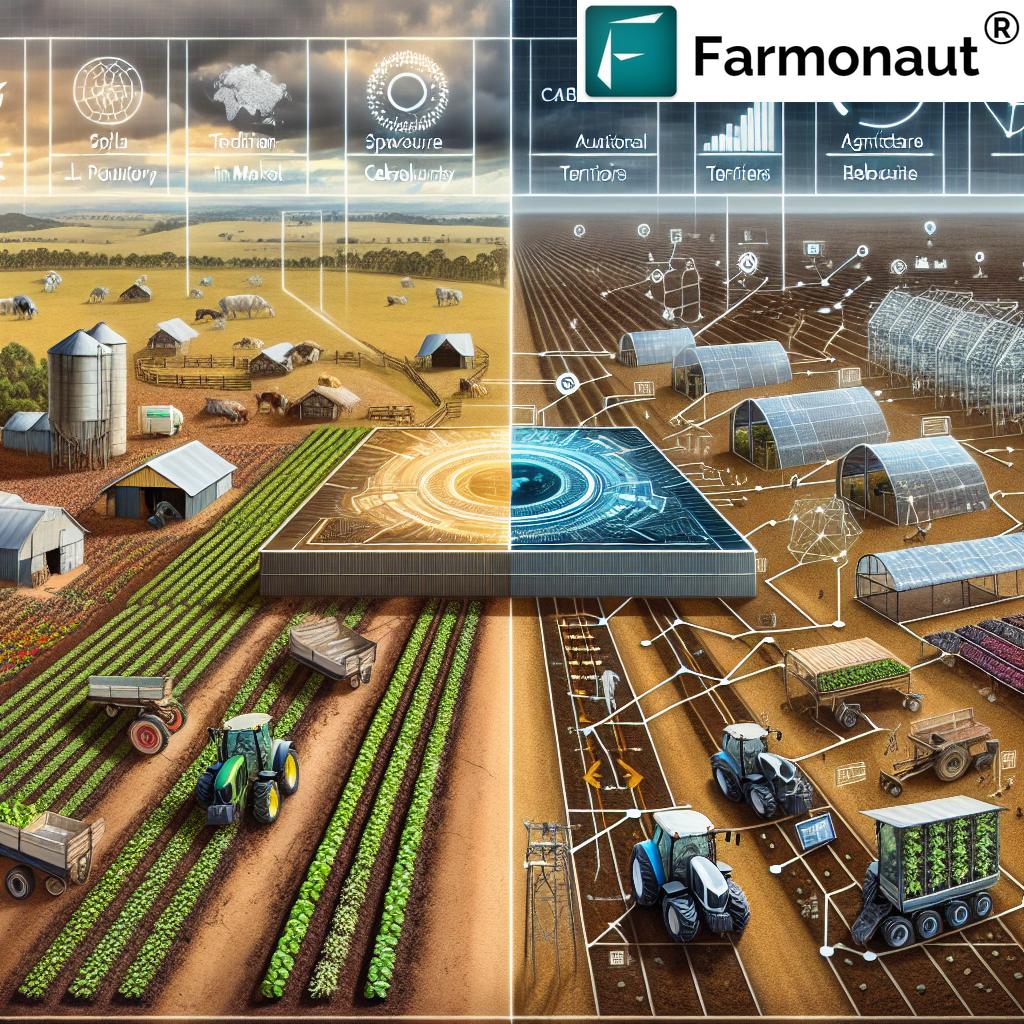
Comparative Analysis of Critical Forces Shaping Australia’s Agricultural Future
| Critical Force | Potential Impact on Australian Agriculture | Trend Direction | Farmonaut Solution |
|---|---|---|---|
| Climate Change | Altered growing seasons, increased water scarcity, more extreme weather events | ↑ | Satellite-based crop health monitoring, AI-driven climate adaptation strategies |
| Digital Revolution | Improved efficiency, precision agriculture, data-driven decision making | ↑ | Jeevn AI Advisory System, IoT integration, data analytics |
| Global Market Dynamics | Price volatility, changing export opportunities, need for market adaptability | → | Real-time market insights, production planning tools |
| Emerging Technologies | New farming methods, increased productivity, potential ethical concerns | ↑ | Integration with cutting-edge agtech, ongoing platform updates |
| Sustainability Pressures | Shift to eco-friendly practices, potential for carbon farming, biodiversity focus | ↑ | Carbon footprinting, sustainable resource management tools |
| Demographic Shifts | Labor shortages, need for digital skills, changing farm ownership patterns | ↑ | User-friendly interface, automation support, training resources |
| Biosecurity Concerns | Increased pest and disease risks, stricter food safety regulations | ↑ | Blockchain-based traceability, early detection systems |
| Energy Transition | Adoption of renewable energy, changes in resource management | ↑ | Energy efficiency monitoring, resource optimization tools |
| Policy Environment | New regulations, potential carbon pricing, data governance challenges | → | Compliance support tools, policy impact assessments |
| Consumer Trends | Demand for organic and plant-based products, focus on sustainability | ↑ | Market trend analysis, sustainable farming certification support |
Conclusion: Navigating the Future with Farmonaut
As we’ve explored, the future of Australian agriculture is being shaped by a complex interplay of forces, from climate change and technological advancements to shifting market dynamics and consumer preferences. These challenges present both risks and opportunities for farmers and agribusinesses across the country.
At Farmonaut, we’re committed to empowering Australian farmers with the tools and insights they need to navigate this evolving landscape successfully. Our comprehensive platform, combining satellite technology, AI-driven analytics, and blockchain solutions, is designed to address the multifaceted challenges facing modern agriculture.
By leveraging our solutions, farmers can:
- Adapt to climate change with data-driven decision-making
- Embrace digital agriculture to improve efficiency and sustainability
- Navigate market volatility with real-time insights and planning tools
- Meet evolving regulatory requirements and consumer demands
- Optimize resource use and reduce environmental impact
As we look to the future, it’s clear that success in agriculture will require adaptability, innovation, and a commitment to sustainability. With Farmonaut as your partner, you’ll be well-equipped to meet these challenges head-on and thrive in the changing agricultural landscape.
Ready to future-proof your farm? Explore our subscription options below and join the agricultural revolution today!
Frequently Asked Questions
Q: How can Australian farmers best prepare for climate change impacts?
A: Australian farmers can prepare for climate change by diversifying crops, implementing water-efficient irrigation systems, adopting conservation agriculture practices, and utilizing climate monitoring tools like those offered by Farmonaut to make data-driven decisions.
Q: What role will artificial intelligence play in the future of Australian agriculture?
A: AI will play a crucial role in predictive analytics for crop yields, pest management, and market trends. It will also optimize resource use, automate farming processes, and provide personalized recommendations for farm management, as demonstrated by Farmonaut’s Jeevn AI Advisory System.
Q: How can small-scale farmers in Australia compete in an increasingly globalized market?
A: Small-scale farmers can compete by focusing on niche markets, adopting precision agriculture techniques to improve efficiency, leveraging direct-to-consumer marketing strategies, and using platforms like Farmonaut to access advanced farming technologies at an affordable cost.
Q: What are the biggest challenges in implementing sustainable farming practices in Australia?
A: The main challenges include initial costs of transitioning to sustainable methods, lack of knowledge or training, resistance to change traditional practices, and the need for long-term planning in the face of short-term economic pressures. Farmonaut helps address these by providing affordable access to sustainable farming tools and education.
Q: How will the increasing focus on traceability affect Australian agricultural exports?
A: The focus on traceability will likely enhance the reputation of Australian agricultural exports, especially in premium markets valuing food safety and sustainability. However, it may also increase compliance costs. Farmonaut’s blockchain-based traceability solutions can help farmers meet these requirements efficiently.
For more information on how Farmonaut can help you navigate these challenges, visit our API Developer Docs or contact our support team.



